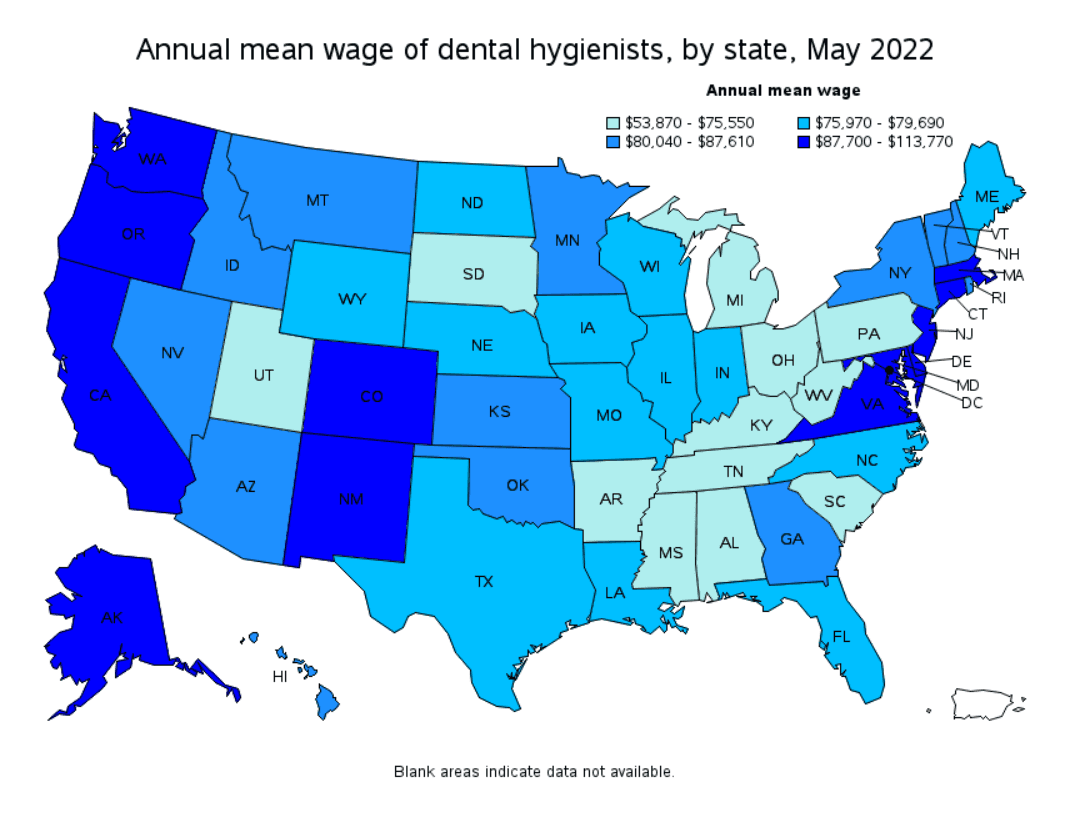Guides and reports
A career as a dental hygienist is more than just exciting—it's packed with diverse benefits and opportunities. From traditional perks like health insurance and retirement contributions to lifestyle advantages like flexible scheduling and job stability, knowing what to expect is crucial whether you're new to the field or considering a change. This guide will help you understand the benefits of being a dental hygienist and make informed decisions about your career path.
Jan 10, 2025
Comprehensive Benefits Package for Dental Hygienists
As a dental hygienist, your compensation can go well beyond your base salary.
According to the U.S. Bureau of Labor Statistics, the median annual wage is $89,890, with top earners reaching over $100,000.
State-level salaries for dental hygienists vary significantly. As of May 2023, dental hygienists in Washington earn an average annual wage of $123,510. California follows with an average wage of $118,330, and Alaska at $115,980.

When it comes to other perks and benefits, here’s how it shakes out:
47% of employers provide health insurance to dental hygienists
51% of full-time hygienists getting employer contributions to retirement plans
47% of hygienists get dental coverage
38% of dental practices provide full reimbursement for continuing education
Non-traditional perks are becoming increasingly important, including flexible scheduling options, uniform stipends, and production bonuses.
Whether you're full-time or part-time makes a big difference in the benefits you receive. Full-time positions typically offer more comprehensive packages.
Part-time roles, on the other hand, provide flexibility and the chance to work at multiple practices.
Government agencies and larger group practices generally offer the most robust benefits, including paid time off, health insurance, and retirement plans.
Lifestyle and Work-Life Balance Benefits
Flexibility has historically been a challenge in traditional dental offices due to rigid scheduling—patient appointments are often booked months in advance, leaving little room for scheduling adjustments.
Today, dental hygienists can access various flexible scheduling options that accommodate different lifestyle needs and personal commitments.
Full-time positions typically involve working 32-40 hours per week, while part-time opportunities allow you to work fewer hours. According to the Bureau of Labor Statistics, many dental hygienists work part-time, and some even work for multiple dentists throughout the week.
Flexibility doesn't stop at choosing between full-time and part-time. You might opt for:
Working only one or a couple days a week at an office
Splitting your week between different practices
Seasonal work that fits your schedule
To address the need for more scheduling flexibility, dental staffing platforms like Teero have emerged as solutions. They allow hygienists greater control over their schedules, and provide opportunities to choose when and where to work without the constraints of traditional office settings.
Flexible scheduling is especially valuable if you're balancing other commitments like family responsibilities, continuing education, or personal interests. For instance, new parents can arrange their work around childcare needs, while semi-retired professionals can maintain a lighter workload while staying active in the field.
Career Growth and Professional Development
The field of dental hygiene offers diverse paths for professional advancement and specialization.
Many dental hygienists advance their careers by specializing in areas like periodontics or pediatric dentistry. With additional training, you can qualify for expanded functions in some states, taking on more advanced clinical responsibilities as a dental therapist. The Bureau of Labor Statistics projects a 9% growth rate through 2033, with approximately 16,400 job openings annually---an indicator of strong opportunities for career progression.
Your career path can extend into education, where you might train future dental professionals at hygiene schools. Research positions at pharmaceutical companies or public health organizations offer another avenue for growth. Some hygienists move into management roles within dental practices or pursue opportunities in dental product development and sales.
Pursuing a bachelor's degree can unlock additional opportunities in education, pharmaceutical companies, or public health sectors.
Job Security and Market Demand
The dental hygiene profession offers exceptional job security, with the Bureau of Labor Statistics projecting an 11% growth rate through 2030, significantly faster than the average for all occupations. The growth is driven by factors like an aging population needing more dental care and increased awareness of preventive dental health.
Dental hygiene also stands out for its resistance to automation and outsourcing. Technology might make dental practices more efficient, but the hands-on nature of your work ensures that human skills remain irreplaceable in this field.
Plus, the profession gives you geographic freedom since dental hygienists can find employment opportunities virtually anywhere in the country. This flexibility allows you to relocate without worrying about job availability, whether you're moving to a major metropolitan area or a smaller community.
If you're seeking variety in your work environment, the strong market demand creates opportunities to work in different settings—from private practices, dental service organizations, and hospitals to nursing homes and public health facilities.
Personal and Professional Fulfillment
As a dental hygienist, you'll experience fulfillment that goes beyond the technical aspects of the job. You'll build meaningful relationships with patients through regular visits, watching them improve their oral health habits and gain confidence in their smiles.
Professional autonomy is a significant source of satisfaction in this field. Working independently within the dental team, you'll carry out procedures and make clinical decisions. This level of responsibility, combined with respect from other dental professionals, creates a rewarding work environment where your expertise is valued.
Your impact extends well beyond oral health. You play a crucial role in patients' overall well-being, helping control conditions like diabetes and cardiovascular disease through proper oral care.
You'll become an educator and advocate, empowering patients with knowledge about oral hygiene practices that can prevent serious health issues, including respiratory infections and complications during pregnancy.
Find Flexible Dental Hygiene Positions
As a dental hygienist, you have exceptional flexibility in shaping your career. Many work part-time, and some choose to work for multiple practices to create their ideal schedule.
Whether you're balancing family commitments, pursuing additional education, or simply prefer a variable schedule, temporary positions can provide the flexibility you need while maintaining competitive compensation.
Through Teero's platform, you can explore these opportunities and find the perfect match for your schedule—with the potential to transition into a permanent role if desired.
Download the Teero app today to start browsing flexible positions that align with your career goals.
